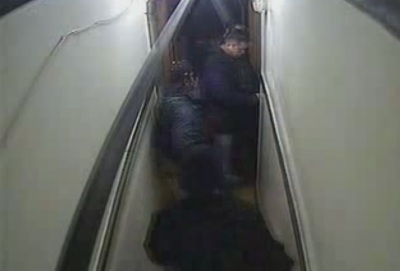In his closing arguments, federal prosecutor Rodney Villazor described how a “run-of-the-mill” narcotics possession case became part of an ongoing black eye for the SFPD, when in March 2011 the San Francisco Public Defender’s Office released Henry Hotel security camera footage of the raid.
It’s the second federal criminal trial against SFPD plainclothes officers in recent months as investigations into the videos make their way through the criminal justice system. Two other officers were convicted of taking money from drug suspects and pocketing it, among other charges, in December. They have not yet been sentenced.
“What was on the video was irreconcilable with what was in the police report,” Villazor told the jury. “Why? Because Arshad Razzak was falsifying, falsifying it to cover up their actions … to go into Jessica Richmond’s room without a warrant.”
Defense attorneys argued officers had the right to enter the room without a warrant because there were exigent circumstances, an exception to the Fourth Amendment’s warrant requirement. Police had reason to believe the heroin would be moved, and soon. But the raid became confused, with some officers testifying they believed they would “freeze” the room from outside and get a warrant, while at least one of the officers thought the plan was to enter the apartment.
‘Freeze the Room’ or ‘Key the Door?’
The security camera video shows four officers, Yick in front, charging onto the fifth floor of the Henry Hotel. Yick covers one of the cameras with his hand while the other three officers pass him. He testified that this was common practice, to keep the hotel’s desk clerk from alerting residents that police were coming.
But there were other cameras.
With Madrid now in the lead, the officers turned a corner and approached Room 504. Somehow, Madrid had a master key, but none of the officers who testified could remember how he got it, including Madrid.
Yick testified that he understood the idea to “freeze the room” to mean to lock it down from the outside, he said.
But as he rounded the corner, he saw Madrid walk directly to the door with Forenis and Razzak behind him. He appeared to immediately insert the key and open the door.
“It wasn’t the plan,” Yick testified. “That’s not freezing the room.”
Federal prosecutors granted Madrid immunity from prosecution in the case in exchange for his testimony. He said Razzak told him to “key the door.” Yick and Forenis said they never heard that order. Razzak did not testify.
The video shows Madrid pushing into the room with Forenis on his left, Razzak and Yick on his right.
As soon as he noticed Madrid opening the door, Yick testified, he switched his role from “freezing the room” to backup for the entry.
“Once someone’s going in, your first role is to back that officer up,” Yick said. “This is where you can get killed.”
According to federal prosecutors, the moment officers entered the room without a search warrant, a conspiracy to violate the civil rights of the resident had launched.
“The real plan was just to enter the room,” Villazor told the jury. “They were not going to freeze it. … This is the moment. This is the part they want to cover up.”
Razzak’s defense attorney, Michael Rains, told the jury that officers were doing their job lawfully, as they understood it. He showed Razzak’s training records and argued the senior officer had very little training on the key issue.
“In the last week,” Rains told the jury, “you have heard more about securing a room pending the issuance of a search warrant and exigent circumstances than these defendants have heard in 16 years.”
He added, “He got no training. They’re throwing this guy into hotel rooms … and he’s doing the best he can.”
‘Paper it After’
The officers pulled Carlos Hutcherson and the registered occupant, Jessica Richmond, from the room. Yick said uncapped needles were strewn about the floor and covering the bed. Hutcherson was arrested for possession of some 65 grams of heroin, but a San Francisco Superior Court judge dismissed the case in light of the security camera footage. Scores of other cases were also dropped in the wake of the SFPD video scandal, which includes other incidents in which footage appears to contradict official police reports.
In the Henry Hotel case, Razzak wrote that officers knocked and announced their presence and were met by Richmond at the door, who gave them consent to search the apartment. Richmond did sign a consent-to-search form, brought to the hotel later by two uniformed SFPD officers, but she testified she was coerced into signing it.
“The real plan was to enter the room and then paper it after,” Villazor said, meaning officers intended to create an official paper trail of falsified records to justify the search. “Possibly the most flawed part to this freezing-the-room fantasy: They had a hotel key.”
Defense attorneys argued the charges are a stretch. The officers may have made mistakes, but they intended to do their job lawfully.
“When people conspire, they do not conspire in one limited incident in a case of limited significance against people they do not know,” said Yick's attorney, Peter Furst.
Intent is a key element in every charge against both Razzak and Yick. To be found guilty of conspiracy, they must not only have agreed to enter the room without a warrant, but also to have done so with the intent of violating Richmond’s Fourth Amendment protection against unreasonable search and seizure, according to the court’s instructions to jurors.
Both officers are also charged with deprivation of rights under the color of law.
The most serious charges involve only Razzak and his alleged intentional falsification of a police report and informant pay slip about the incident. Yick was originally charged with similar counts, but both have been dropped over the course of the trial.

